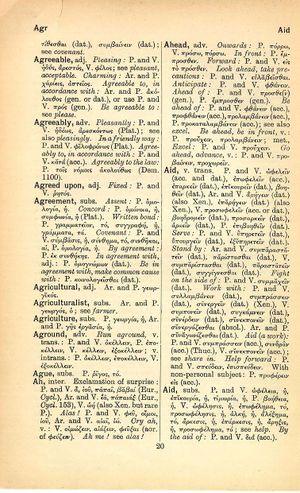agreement: Difference between revisions
From LSJ
μοχθεῖν τε βροτοῖσ(ιν) άνάγκη → and you mortals must endure trouble (Euripides' Hippolytus 208)
(Woodhouse 2) |
(CSV3) |
||
| Line 1: | Line 1: | ||
{{ | {{Woodhouse1 | ||
| | |Text=[[File:woodhouse_20.jpg|thumb|link={{filepath:woodhouse_20.jpg}}]]'''subs.''' | ||
<b class="b2">Assent</b>: P. [[ὁμολογία]], ἡ. | |||
<b class="b2">Concord</b>: P. [[ὁμόνοια]], ἡ, [[συμφωνία]], ἡ (Plat.). | |||
<b class="b2">Written bond</b>: P. [[γραμματεῖον]], τό, [[συγγραφή]], ἡ, γράμματα, τά. | |||
<b class="b2">Covenant</b>: P. and V. [[σύμβασις]], ἡ, [[σύνθημα]], τό, συνθῆκαι, αἱ, P. [[ὁμολογία]], ἡ. | |||
<b class="b2">By agreement</b>: P. ἐκ συνθήκης. | |||
<b class="b2">In agreement with</b>, adj.: P. [[ὁμογνώμων]] (dat.). | |||
<b class="b2">Be in agreement with, make common cause with</b>: P. κοινολογεῖσθαι (dat.). | |||
}} | }} | ||
Revision as of 09:19, 21 July 2017
English > Greek (Woodhouse)
subs.
Assent: P. ὁμολογία, ἡ.
Concord: P. ὁμόνοια, ἡ, συμφωνία, ἡ (Plat.).
Written bond: P. γραμματεῖον, τό, συγγραφή, ἡ, γράμματα, τά.
Covenant: P. and V. σύμβασις, ἡ, σύνθημα, τό, συνθῆκαι, αἱ, P. ὁμολογία, ἡ.
By agreement: P. ἐκ συνθήκης.
In agreement with, adj.: P. ὁμογνώμων (dat.).
Be in agreement with, make common cause with: P. κοινολογεῖσθαι (dat.).

